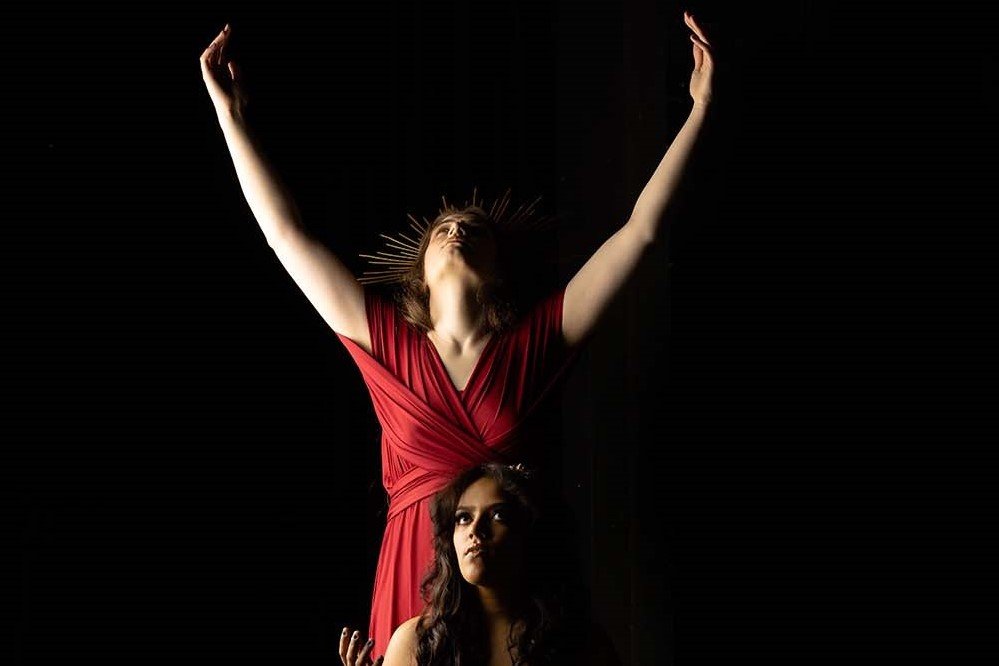
Following multiple pandemic-related postponements, CUW Professor Lori Woodall-Schaufler’s adaptation "Medea: An Aesthetic Exploration of Love, Betrayal and Revenge" will finally premier on the CUW stage.
The project started almost three years ago, before the Covid-19 pandemic seemingly shut down the whole world. Initially scheduled to debut in April 2020, Woodall-Schaufler’s original adaptation of this classic play is finally ready to hit the stage.
Based on the classic Greek tragedy of Medea and the mythology of Medea and her marriage to Jason, this play explores the demise of their relationship after Jason betrays Medea and marries the daughter of King Creon to advance his status. Set in the ancient world with some modern flair, this play utilizes dance, music, masks, and visual art to create a blended aesthetic of this ancient tragedy.
The play will debut on Thursday, April 28, with six performances scheduled through the weekend at the Todd Wehr Auditorium on the CUW campus:
- Thursday, April 28 | 7:30 p.m.
- Friday, April 29 | 7:30 p.m.
- Saturday, April 30 | 1:30 p.m. & 7:30 p.m.
- Sunday, May 1 | 1:00 p.m. & 7:30 p.m.
Tickets may be purchased HERE.
Note: This play is intended for audiences aged 13 and older.
Writer/Director Q&A
We asked Woodall-Schaufler to tell us about her approach to adapting the play, and what the story might mean to modern audiences.
What attracted you to the story of Medea?
“Years ago, I directed Antigone at CUW, but that was the last time we had staged a Greek tragedy. Since then our students have been interested in mounting another Greek tragedy. I have always been intrigued by the story of Medea, which is unusual in that it’s a very female-centric Greek tragedy. At the time, we had a lot of women in our theatre program, so it was an easy choice to make.”
How did your approach your adaptation of the play?
“I had read several adaptations and wanted to create something that folded in some of the mythology a little bit more, because she’s such an interesting and fascinating mythological character. I felt that Medea was always portrayed one way or another: either as a hateful witch or she a sympathetic character who was rejected by her husband. I wanted to sort of blend those so that she wasn’t so one-dimensional.”
What themes are explored in this work?
“As the subtitle says, it’s about love, betrayal, and revenge. With mythology, everything is larger than life and exaggerated, with all these crazy story lines, but I think it’s a reflection on what happens when you don’t have Christ as an anchor in your life, about how our emotions can really spiral out of control. It’s almost like, this is who we’d be without God, without Christ, and the destructiveness of our sinful nature.”
What does the term “aesthetic exploration” mean?
“As a theatre artist myself, I like to blend all art forms, like dance and music. In the ancient Greek world, they blended dance and music into every production. So I have a dancing chorus, there’s music, there’s drumming throughout it. And a lot of the staging ideas come from the art world, and a lot of famous paintings about the Medea mythology. And we’ll have some of that artwork in the lobby for patrons to view. It really is a celebration of all those artforms.”
What else can modern audiences find in these Greek tragedies that feels familiar?
“In some ways, that mythological world is similar in concept to the DC/Marvel universe that has become so popular with young people today. It tells these epic stories, with larger-than-life figures and their wild emotions. And, of course, what makes classic literature endure the test of time is that it deals with universal themes that are just as relevant today as they were thousands of years ago.”
Cast
Written and Directed by Prof. Lori Woodall-Schaufler
Medea: Marlia King
Jason: Andrew Sear
Divine Medea: Talitha Marshall (’20)
Creon: Jackson Bowen
Aegeus: Ryan Murray
Messenger: Jonah McGinnis (’20)
Nurse: Giovanna Greco
Tutor: Noah Merz
Female Chorus: Olivia Zimmermann, Mikayla Kennaugh, Marie Reid, Lily Adam, Kaijay Jiles, Magdalena Horn, Elizabeth Beisel, Isabel McCauley, Clara Ellis, Audrey Stone, Carly Stanek and Allie Pingel.
Male chorus of soldiers: Zion Nelson, Colin McGarigle, James Pape, Benjamin Hedrick, Caleb Dunst, Aaron Jackson, Ethan Stollenwerk
For more information about the Theatre program at Concordia University Wisconsin, visit the Department of Theatre at cuw.edu.
— This story is written by Mike Zimmerman, videographer/photographer for Concordia University Wisconsin. He may be reached at michael.zimmerman@cuw.edu or 262-243-4380.
If this story has inspired you, why not explore how you can help further Concordia's mission through giving.